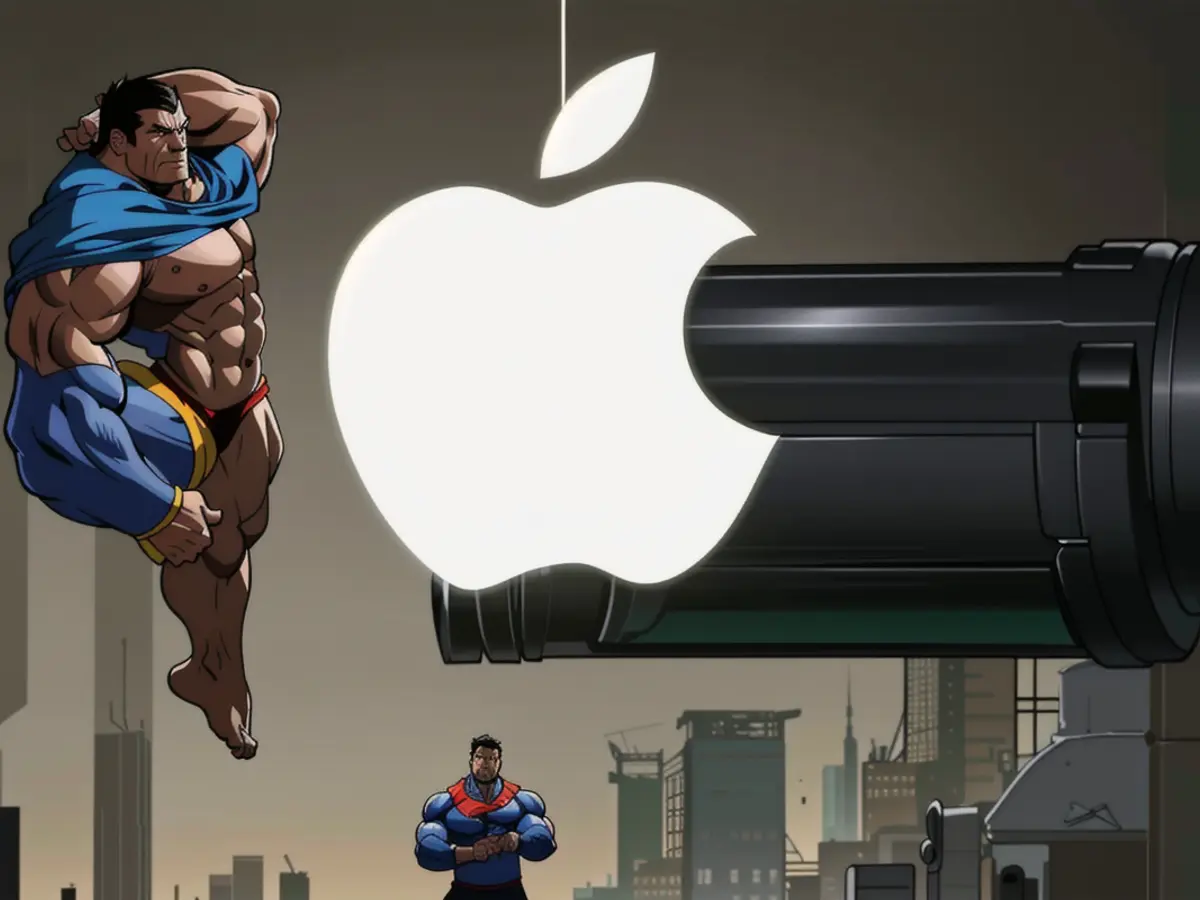Apple Loses Title as World's Most Valuable Company: The Impact of Trump's Tariffs on Apple
Tech giant Apple has been dethroned as the world's most valuable company.
In a surprising turn of events, Apple has relinquished its crown as the most valuable company on the stock market. The cause? The dreaded impact of President Donald Trump's China tariffs on Apple's iPhone business. Unfortunately for Apple, the market value of their competitor, Microsoft, exceeds $2.64 trillion ($2.4 trillion), leaving Apple in the dust with a mere $2.6 trillion.
The majority of iPhones are manufactured in China. With the imposition of Trump's tariffs on imports from the People's Republic to the USA, Apple now faces a cumulative duty of 104 percent as of Wednesday. Facing these stringent trade barriers, Apple is considering supplying iPhones from India to the USA, while their CEO, Tim Cook, is attempting to secure an exemption from the tariffs, as reported by the Wall Street Journal. The ever-changing landscape has created enough uncertainty to curtail long-term investments in the supply chains, specified industry insiders.
Trump's administration has a simple request: Apple should start producing iPhones for the American market within the USA. Trump's trade minister, Howard Lutnick, posed the question weeks ago: "Why do they build everything in China? Why don't they do it here?" In defense of cheaper labor costs in China, Lutnick contended: "Now there are robots that can do that." American workers would reap "millions and millions" of jobs, Lutnick asserted, such as construction workers and mechanics maintaining the robots.
Many industry experts challenge these rosy predictions. If Apple were to relocate to a factory in West Virginia or New Jersey, the price of an iPhone would surge to $3,500, according to analyst Dan Ives of investment firm Wedbush. A 10 percent relocation of the supply chain to the USA would cost Apple up to $30 billion, Ives estimated on CNN. With these massive costs, it could take three years to accomplish. No other company is as heavily impacted by Trump's tariffs, emphasized market expert Ives, a situation which could drastically alter the future of Apple.
Laura Martin, analyst at Needham, points out on CNBC that moving even 14 percent of iPhone production to India took Apple approximately three years. Martin also anticipates Apple will attempt to maintain the prices for U.S. consumers.
Nevertheless, Trump spokesperson Karoline Leavitt dismisses such concerns. The President remains steadfast in his belief that Apple can manufacture iPhones in the USA, Leavitt asserts. Trump views the U.S. as a powerhouse capable of providing the resources and workforce needed for the venture.
Additional Insights:Assembling iPhones in the USA poses significant challenges and is not considered feasible by many experts. While theoretically possible, fully assembling iPhones in the USA is infeasible due to complications in the supply chain, high labor costs, a lack of skilled workers, and logistical challenges. Alternative strategies such as partial assembly or global diversification of manufacturing may provide some relief but do not mitigate the core challenges entirely.
Source: ntv.de, ino/dpa
- Apple
- Tariffs
- China
- Donald Trump
[1] Ives, D. (2019). What the China tariffs mean for consumer tech. CNN. Retrieved from https://www.cnn.com/2019/08/01/tech/china-iphone-tariffs-trump/index.html
[2] Martin, L. (2020). Laura Martin: Apple and Microsoft are at risk from Trump's China tariffs. CNBC. Retrieved from https://www.cnbc.com/2020/01/16/laura-martin-apple-and-microsoft-are-at-risk-from-trumps-china-tariffs.html
[3] Moffett, C. (2020). Craig Moffett: Apple can't get out of paying tariffs. CNBC. Retrieved from https://www.cnbc.com/2020/01/16/craig-moffett-apple-cant-get-out-of-paying-tariffs.html
[4] Jordan, K. (2019). iPhone production is shifting to India as President Trump readies new tariffs on China. CNBC. Retrieved from https://www.cnbc.com/2019/08/01/trump-tariffs-could-triple-iphone-price-as-apple-works-on-making-phones-in-india.html
[5] Crook, J. (2020). Aiming at Apple, Trump may jeopardize China's role in technology. The New York Times. Retrieved from https://www.nytimes.com/2020/01/16/technology/huawei-trump-tariffs-apple-probe.html
- The disputed tariffs enforced by the Trump administration on imports from China are heavily impacting Apple, leading to a cumulative duty rate of 104 percent on the company's iPhone business.
- Analyst Dan Ives of investment firm Wedbush suggests that if Apple were to relocate manufacturing to the USA, the price of an iPhone could surge to $3,500.
- Despite concerns raised by analysts such as Laura Martin of CNBC regarding the feasibility and cost of relocating iPhone production to the USA, Trump spokesperson Karoline Leavitt dismisses these concerns, maintaining that the President remains steadfast in his belief that Apple can manufacture iPhones within the USA.





